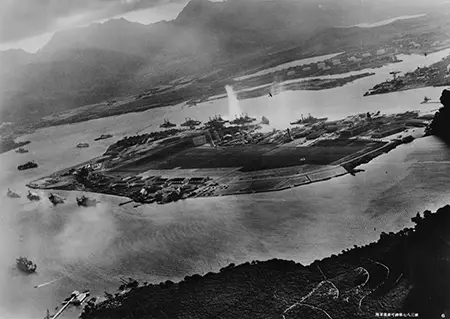Pearl Harbor
United States Backstory
With tensions still ongoing with World War II, the U.S. still considered itself a neutral ally, yet played a big role in the Allied Force. There was always a little bit of controversy surrounding their role with Britain, as it was not seen as a neutral stance to warring countries. This made it easier for other countries to consider going to war with them, since they were indirectly influencing the entire World War 2 with their actions.
The United States was unhappy for some time with Japan’s politics for decades. Japan was facing problems within its own country and needed to expand, so looked to take over the Chinese import market. When Japan declared was on China in 1937, the U.S. responded with economic sanctions and trade embargos on Japan. With the embargo in place, they dramatically changed how Japan fought the war and their chances of winning it.


Japan Backstory
With Japan suffering demographic and economic problems, expanding their reach into China’s territory was the best option. China’s import market was one of the best in the world, and was growing at a rapid rate. When the sanctions were put in place by the U.S., there were a lot of heated debates about whether the sanctions were even fair. With neither side budging, Japan went to the offensive and launched a surprise attack on December 7th 1941.
Their target was the American naval base at Pearl Harbor, and was a surprise attack that lasted 2 hours from the air. It was a majorly successful attack that destroyed several American naval vessels, eight battleships and over 300 airplanes. More importantly, over 2,000 American soldiers lost their lives while over half that amount sustained major injuries.
The day after the attack, President Franklin D. Roosevelt declared war on Japan with Congress having only one ‘nay’ vote. This declaration of war brought in Japan’s allies Germany and Italy, forcing the U.S. to act in kind. Finally after playing neutral, the U.S. was officially in World War II.

Why Was the Attack On Pearl Harbor Important?
Even with the rising tensions between the U.S. and Japan, it was still considered a stretch that Japan would declare war. And the surprise attack was such a devastating blow that it really hit to the center of everyone in America that heard about it. Up to this point the U.S. had stayed semi-neutral and was not forced into any acts of war. And even if an attack by Japan was to take place, Pearl Harbor would be the most unlikely target. The undefended Pearl Harbor was devastated by the attack, and the Pacific Fleet took great damage.

Who Was Affected?
The U.S. was affected the most, as they had no choice but to join World War II and strike back for the horror caused at Pearl Harbor. Anything less than a declaration of war would have been seen as weakness.
Japan hatched an incredible plan with the attack, but certain conditions made it less favorable; they didn’t target supply lines, and U.S. aircraft carriers were not present. A hit on the major U.S. aircraft carriers would have been devastating, and a lot harder to recover from.

Names to Remember
Jeanette Rankin was born on June 11th 1880 and was the only vote in Congress that was against entering World War II. She was the first woman to be elected to the U.S. House of Representatives in 1916, and is a well-known pacifist.

Important Facts
Here are some important things to remember about Pearl Harbor.
• December 7th 1941 is when Japan attacked Pearl Harbor
• Over 3,400 miles were traveled by the Japanese to reach Pearl Harbor
• Plans for the attack are said to have been started as early as January of 1941
• The attack damaged ships, the base and airplanes but left supply facilities unharmed
• U.S. aircraft carriers were not present at the Naval base during the attack
• President Roosevelt delivered an empowering speech on the incident on December 8th 1941

Conclusion
The damage done by the surprise Pearl Harbor attack was a great strategy by Japan, with its only failure being to destroy supply facilities. But this wasn’t the end of the battle, and would serve as a harsh beginning for when the U.S. entered World War II.



